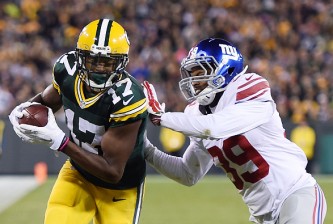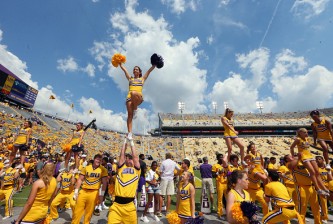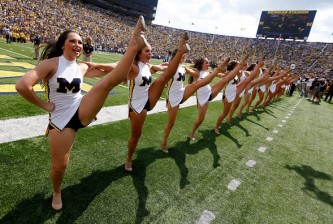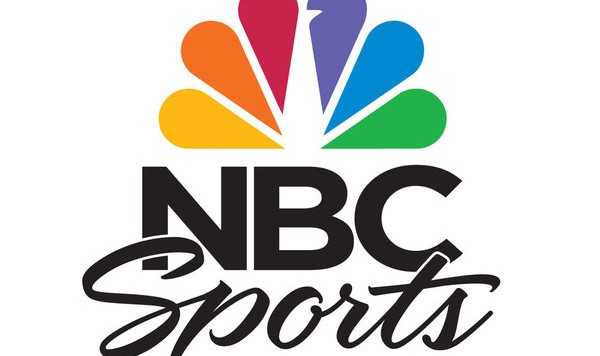Tom Kohler of King of Prussia, PA (I’ve actually been to King of Prussia, PA) has a look at two different sports properties, both on NBC and how on chose to leave its long-time home and the other chose to remain for the foreseeable future:
There have been a plethora of sports media deals over the last twelve months. From CBS’ new Thursday Night Football package, to NASCAR’s eight billion dollar deals with Fox and NBC, the sports rights bubble continues to grow with no sign of bursting anytime soon. Live, unscripted sports are the single most valuable property in television. With every major media company in the game and fewer and fewer deals to be had, sports leagues and college conferences continue to cash in.
Two deals made in the last year stand out. They both came out of nowhere. Both featured enormous increases over previous deals, garnered a slew of attention and were game changers for their respective media companies. Yet they are each rooted in two completely different philosophies and each organization feels they are doing what’s best for their future.
In August 2013, on the eve of the PGA Championship, United States Golf Association (USGA) announced a 12-year contract with Fox Sports. A company that has never produced golf telecasts in the United States is now the home for our National Championship. Everything from the timing of the announcement, to the shunning of long term partners at NBC and ESPN left an odd taste in many mouths. Despite the spin from the USGA that it was looking for a bold innovator who could advance the game, and increased coverage of amateur events, it all seemed disingenuous. Stealing the spotlight from the PGA Championship and stabbing its network partner (NBC) in the back overshadowed this deal. NBC and its Comcast cousin Golf Channel were not even given the courtesy of a phone call to be informed that they had in fact lost the rights. They found out when everyone else did.
Compare the approach of the USGA with that of the International Olympic Committee (IOC). Just three years ago NBC outbid ESPN and FOX for 4 Olympic Games through 2020. Many expected that the IOC would open a new round of bidding for future games in the latter part of this decade. Given the increasing number of sports channels in the US and the strong potential of an Olympic Games based in the United States, the IOC could have been in line for a whopping increase. Then out of the blue in early May, the IOC announced a 12 year extension with NBC to cover an additional 6 games. With this record $7.3 Billion deal, NBC will be the home of the Olympics through 2032. I will be 52 years old at the end of that contract. I was 4 the last time a network that wasn’t NBC aired the summer games.
These two deals underscore two very different approaches to sports media rights. The USGA talked at length in their August release about how great their new partnership with Fox was going to be. They echoed the same sentiments in the spring of 1994 when they left their first marriage of 29 years with ABC to go to NBC. Each partnership was later abandoned in pursuit of something more. However, the IOC genuinely celebrates their longtime marriage with NBC Universal. They could have awarded the 2024 games to the United States and sit back and watch NBC, ESPN, Fox, CBS, Turner, Google and Apple claw each other to get the next Olympic media contract. Instead they felt the best thing they could do was grow the movement in America with the same family they have been with for generations.
Last June, the US Open was in my backyard at Merion. The entire Philadelphia region was abuzz over our National Championship returning to one of the most important venues in the history of the game. The event seemed all the more special by the quality production it was given by NBC. Just two months later, the USGA abruptly walked out on their second marriage for a younger partner. Like many who leave a long-term relationship, they seemed to feel like something was missing. For the USGA, the feeling of being less popular than The Masters was something they grew tired of. They feel Fox can attract a new, younger audience.
The IOC on the other hand is just as in love with NBC as the day they met, and vice versa. Many felt with Comcast’s purchase of NBC Universal and the subsequent departure of NBC Olympic guru Dick Ebersol that the IOC would look to change course. Instead they stayed with the NBC Universal, who has continued to show that the Olympic movement is more to them then 2 weeks of programing. Brian Roberts, and the Comcast team have shown they value the Olympic Movement. That it’s not just another event on their sports lineup along with the NBA or College Football. That it’s not just a property they desire to increase cable subscriber fees. With this latest deal, NBC’s relationship with the Olympic Movement will approach a half-century. Very few sports have those kinds of relationships with their media partners. Those that do become so synonymous with their media partner, you really can’t imagine what it would be like to not see The Masters on CBS or the Indianapolis 500 on ABC. The Olympics on NBC are now part of that lineage. The USGA will continue to struggle to be included in that discussion unless they can commit to make their relationships last. I hope for their sake, and the sake of the game, that in their third marriage, they can find happiness.
Tom Kohler is a local sports television producer from King of Prussia, PA. He is an avid follower of the sports media industry, and counts Fang’s Bites as one of his regular reads on the subject. You can follow him on Twitter @TomKohlerUM.























